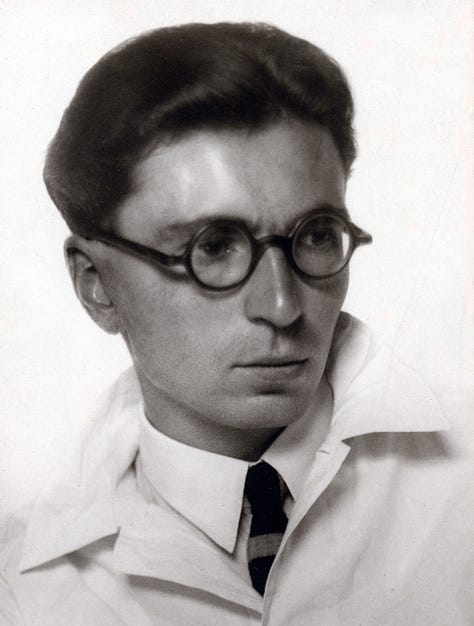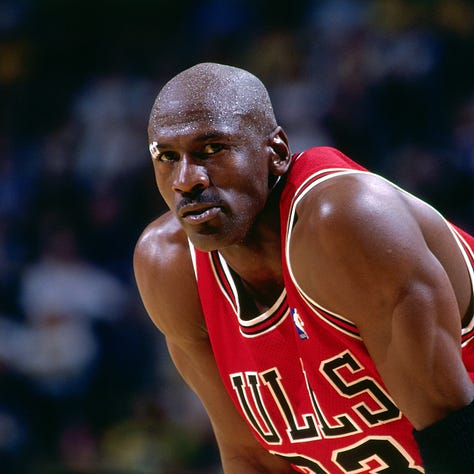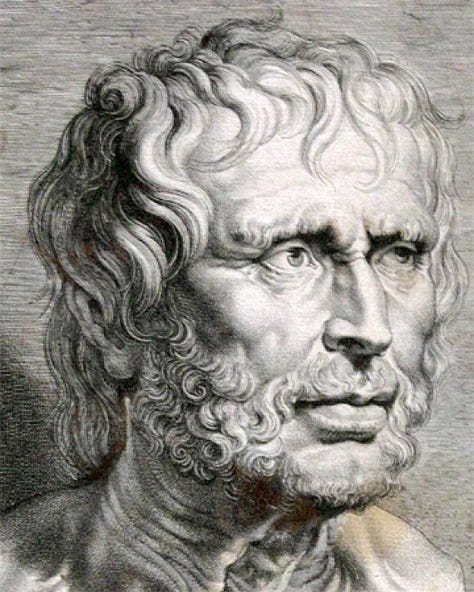The Writer’s Thoughts
Albert Camus — On the Inherent Struggle of Human Existence
A face that toils so close to stones is already stone itself! I see that man going back down with a heavy yet measured step toward the torment of which he will never know the end. That hour like a breathing-space which returns as surely as his suffering, that is the hour of consciousness. At each of those moments when he leaves the heights and gradually sinks toward the lairs of the gods, he is superior to his fate. He is stronger than his rock.
Is the struggle itself enough for you? We are told that Sisyphus is the absurd hero. He is, as much through his passions as through his torture. His scorn of the gods, his hatred of death, and his passion for life won him that unspeakable penalty in which the whole being is exerted toward accomplishing nothing. This is the price that must be paid for the passions of this earth. Nothing is told us about Sisyphus in the underworld. Myths are made for the imagination to breathe life into them.
I conclude that all is well," says Oedipus, and that remark is sacred. It echoes in the wild and limited universe of man. It teaches that all is not, has not been, exhausted. It drives out of this world a god who had come into it with dissatisfaction and a preference for futile suffering. It makes of fate a human matter, which must be settled among men.
The boundless grief is too heavy to bear. These are our nights of Gethsemane. But crushing truths perish from being acknowledged. Thus, Edipus at the outset obeys fate without knowing it. But from the moment he knows, his tragedy begins. Yet at the same moment, blind and desperate, he realizes that the only bond linking him to the world is the cool hand of a girl. Then a tremendous remark rings out: "Despite so many ordeals, my advanced age and the nobility of my soul make me conclude that all is well." Sophocles' Edipus, like Dostoevsky's Kirilov, thus gives the recipe for the absurd victory.
All Sisyphus' silent joy is contained therein. His fate belongs to him. His rock is a thing. Likewise, the absurd man, when he contemplates his torment, silences all the idols. In the universe suddenly restored to its silence, the myriad wondering little voices of the earth rise up. Unconscious, secret calls, invitations from all the faces, they are the necessary reverse and price of victory. There is no sun without shadow, and it is essential to know the night. The absurd man says yes and his effort will henceforth be unceasing. If there is a personal fate, there is no higher destiny, or at least there is, but one which he concludes is inevitable and despicable. For the rest, he knows himself to be the master of his days.
Food For Thought



Victor Frankl |"Between stimulus and response there is a space. In that space is our power to choose our response. In our response lies our growth and our freedom."
Viktor Frankl, an Austrian neurologist and psychiatrist, was a Holocaust survivor whose life and work exemplified resilience in the face of extreme suffering. Born in 1905, he pursued medicine and specialized in neurology and psychiatry, focusing on depression and suicide prevention. During World War II, Frankl and his family were taken to concentration camps, where he endured unimaginable suffering, losing both his parents and his pregnant wife.
Despite these hardships, Frankl's experiences in the camps shaped his life's work, resulting in the development of logotherapy, a form of existential psychotherapy based on the belief that the primary human drive is to find meaning in life. He maintained that even in the most dire circumstances, individuals could find purpose and reason to live. His bestselling book, "Man's Search for Meaning," chronicles his time in the camps and explores this philosophy in depth.
One notable example of Frankl's ability to cope with suffering is when he was forced to choose between staying with his dying father or leaving with his wife. He ultimately chose to stay, demonstrating that the search for meaning can sometimes involve making difficult, selfless decisions.
Throughout his career, Viktor Frankl published numerous books and articles, lectured globally, and received various awards for his contributions to psychology. He passed away in 1997, but his work continues to inspire and help people find meaning and resilience in the face of adversity.
Michael Jordan | "I've missed more than 9,000 shots in my career. I've lost almost 300 games. Twenty-six times, I've been trusted to take the game-winning shot and missed. I've failed over and over and over again in my life. And that is why I succeed."
Michael Jordan, born in 1963, dominated the world of basketball during his tenure with the Chicago Bulls, earning six NBA championships and five MVP awards. Jordan's journey to greatness began in college, where he played for the University of North Carolina, hitting the game-winning shot in the 1982 NCAA Championship.
Facing setbacks early in his career, Jordan was cut from his high school varsity team as a sophomore, fueling his determination to excel. As a professional, he faced further adversity during the Bulls' playoff losses to the Detroit Pistons in 1988, 1989, and 1990. These defeats pushed him to train harder, ultimately leading to the Bulls' first championship in 1991.
In 1993, Jordan faced immense personal suffering following his father's murder. Despite this tragedy, he channeled his grief and pursued a baseball career to honor his late father's dream. After two years, he returned to basketball, leading the Bulls to three more championships.
Jordan's legacy transcends basketball, with his brand, Air Jordan, and ownership of the Charlotte Hornets. His philanthropic endeavors include funding medical clinics in low-income areas and supporting education initiatives.
A testament to his resilience, Jordan's career exemplifies overcoming suffering and adversity. His unwavering determination to succeed, even in the face of personal and professional setbacks, cements his status as a true icon.
Seneca the Younger | "It is not the man who has too little, but the man who craves more, that is poor. What you have been given, let it be enough, and do not thirst for further process, for that is endless."
Seneca the Younger (c. 4 BC - AD 65) was a prominent Roman philosopher, playwright, and statesman, whose works made him one of the most influential Stoic philosophers. Born in Cordoba, Spain, Seneca was educated in Rome and went on to serve as an advisor to Emperor Nero. He was a prolific writer, producing tragedies, essays, and letters that delved into ethics, politics, and the human condition.
Throughout his life, Seneca faced personal suffering and political turmoil. He was exiled to Corsica by Emperor Claudius, accused of adultery with the emperor's niece. During his exile, Seneca wrote "Consolation to Helvia," a letter to his mother, in which he demonstrated resilience by emphasizing the importance of the inner self and focusing on personal virtues.
A significant example of Seneca's teachings on dealing with suffering is his essay "On Providence." He argued that adversity was a test of character and that wise individuals should embrace suffering to develop resilience and strength. According to Seneca, facing hardships allowed individuals to recognize their true potential and refine their virtues.
Seneca's life came to a tragic end when he was accused of conspiring against Nero. Ordered to commit suicide, he did so with Stoic dignity, calmly discussing philosophy with his friends as he bled to death. His writings remain influential today, offering timeless wisdom on overcoming suffering and finding inner strength.
The Gallery
"Christ in the Wilderness" by Ivan Kramskoy (1872)
The painting depicts Jesus in the desert, surrounded by barren rocks and withered trees, enduring the physical and spiritual trials of his forty-day fast.
What makes the painting remarkable is its focus on the human side of Christ's suffering, rather than his divine nature. Spencer portrays Jesus as a vulnerable, exhausted man, slumped on a rock and clutching his side in pain. The artist himself stated that the painting was not meant to be a religious statement, but a representation of the struggle and perseverance required in any human endeavor.
The painting also includes subtle symbols of hope and renewal. In the background, a stream flows through the desert, hinting at the possibility of life and growth even in the harshest conditions. Additionally, a small green plant is visible at Christ's feet, a symbol of the resilience and tenacity required to survive and flourish in the face of adversity.
Overall, "Christ in the Wilderness" is a powerful reminder of the human capacity for perseverance and resilience in the face of suffering.







